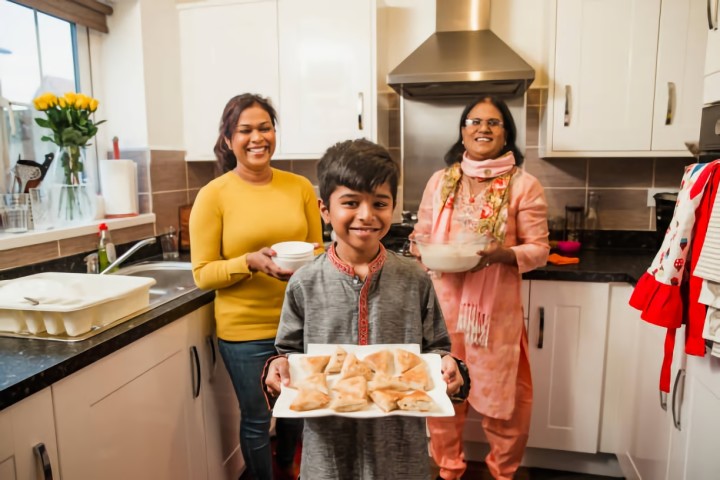Back to Basics: 5 Old-Fashioned Habits are Timeless
There’s a tinge of dismissal to the word “old-fashioned.” Old-fashioned sounds outdated, obsolete, no longer relevant. But I believe when it comes to habits, there are some that I consider timeless.
Growing up on the small and beautiful island of Mauritius, I had the privilege to know life before technology became a central part of daily life. Safety is the cornerstone of a happy childhood and in Mauritius in the 80s, we found that safety in routine.
Having no phones, my friends and I would dutifully meet on the neighboring soccer field or at a friend’s house on specific days. And every Sunday, the whole family would meet and gather at the beach! It was a habit to be social. We had each other.
These days, we have our phones.
I have worked in the technology industry all my life and yet it’s still jarring to realize how much it has changed people’s lives just in the last few decades. It's the kind of change that demands we change with it. But adaptation doesn’t always have to mean new. In my experience, it can also mean rediscovering ways that we have been slowly forgetting or tricked into thinking we no longer need them.
Some particular habits are especially important to me, simply because I believe they are good for the soul. Note that in this article, I’m using “habits” in the context of something that is an ingrained part of daily life, not something one does in their spare time — a hobby.
Preparing and having family meals together
Coming together to enjoy a meal is, I still firmly believe, one of the most important rituals of family life. It helps foster closeness among family members. If parents provide a safe space for children (especially) during mealtimes, conversations can flow without judgment, nurturing the children’s communication skills and their self-confidence. Parents, in turn, can ensure the children are eating healthier meals, teaching healthier eating habits along the way and preventing weight-related problems.

Other benefits of eating together as a family, according to the Swedish Health Services, include:
- Nurturing well-adjusted kids. Children who feel accepted and seen at home are less likely to seek approval somewhere or from someone else.
- Kids do better in school. Table talk exposes kids to new words and ideas. Parents are also more likely to know about test dates and homework which may make them more involved in their kids’ academic life.
Additionally, the Department of Homeland Security emphasizes the importance of shared mealtime as a way to reduce work and school-related stress. It also helps reduce tension at home so that everyone can live together as a happy, functional, and close-knit family unit.
Being bored
Growing up before the internet, I had the privilege of getting bored. Of course, I didn’t find it an advantage back then. I was bored alone and often with friends. But it’s also this boredom that allowed us to nurture our creativity. Occasionally, we would get some fun out of it, sometimes we would run into trouble. But it’s also those moments that we remember most from our childhood.
These days, we avoid boredom like the plague — sometimes unconsciously. The algorithm that makes social media and other apps so fun is in fact training our brains to be addicted to stimulation. It trains us to crave fun and it does not like pauses. If you find yourself reaching for your phone for no reason at all, then you know what I’m talking about.
But it turns out, boredom is actually a good thing. Clinical psychologist Stephanie Lee says that being bored allows children to tolerate “less than ideal life experiences”. In real life, not everything is fun; life will be frustrating in many ways. A bored child, then, learns to regulate their emotions to cope with this reality — a skill that will prove useful for them throughout life.
Boredom also helps nurture children’s planning and problem-solving skills. If a child has a life that is overplanned, they will not have the opportunity to explore their own skills and test their self-reliance. When a child is bored, they think, plan, organize, and create their own fun. The freedom to act on one’s own devices and use one’s skills to their limits is one of the key skills children need to learn early on.
 Image by Мария Воскресенская on Pexels
Image by Мария Воскресенская on Pexels
Among children and adults alike, boredom gives one an important and necessary break from the constant information overload that is facilitated by our online lives. Taking a break not just from the internet but from the constant demands of the real world helps us relax and cope with stress.
Journaling
Having a personal diary used to be more common in the past. Sitting down in peace and quiet and writing down one’s experiences at the end of the day helps us reflect on these experiences, process them, and move forward.
According to Dr. Jemery Sutton, there are two forms of journaling: expressive journaling and gratitude journaling. Expressive journaling focuses on experiences while gratitude journaling focuses on the positive aspects of life.
I am personally an expressive journal writer, although I might have been unknowingly gratitude journaling for all I know. Having journaled on and off over the years, I can attest to the mental health benefits of keeping one. Journaling has been especially helpful for me when going through the toughest times of my life. It helped me regulate my emotions, reminded me of why I do what I do, and helped me accept changes when there was no other choice forward.
Extensive research on journaling revealed that it confers a wide range of benefits:
- Lowered blood pressure
- Improved liver and lung function
- Better moods
- Less time spent in hospitals
- Less stress-related doctor visits
- Better mental wellbeing
For something that only requires you at least 5 minutes every day, I say that’s a good deal!
Having a group of friends whom one sees regularly
It is one of the great ironies of our age that while it’s never been easier to connect with another human being on the planet, a person can feel lonelier than ever. Harvard’s longest study on happiness revealed one key factor: social connections. Loneliness is a killer; even worse than smoking or alcoholism, according to Massachusetts General Hospital psychiatrist Robert Waldinger. Having close relationships is what keeps people happy throughout life, even more than money or fame.

I say make it a tradition to see your friends in person regularly. Pick up the phone, set a date, and gather in each other’s homes or have Sunday brunches. If it’s important to you, you will make time. You don’t even have to have an important reason to see one another; what’s important is cultivating that feeling of regularity.
If your friends are in another city or country, call them regularly. Or you can explore your new local communities to find a new group of cliques. Nothing makes you feel less homesick than being with people who make you feel at home.
Going for a walk
Walking is a singular activity that has a special place in my heart. When I was fully based in Australia, my afternoon routine consisted of an outdoor stroll that was always a highlight of my day. It helped me unwind and quietly process my personal and professional struggles. And I have lost count of how many times a brilliant idea or a final solution has come to me on these walks. It is a gift that keeps giving.
Here’s what science says about the benefits of walking:
- Just 30 minutes a day helps you maintain your overall well-being
- Improves heart and lung functions
- Keeps body fat low
- Helps manage hypertension
- Helps manage joint and muscular pain
- Helps manage diabetes
- Lowers risk of depression
Given these physical and mental benefits, it’s no surprise that some of the most notable figures in history were habitual walkers. Einstein, Beethoven, and Dickens shared the habit and commonly noted it as a “thoughtful practice that nurtured creativity” and inspired their ideas.
Spending more time in Dubai recently growing the business, I’m still finding an adequate walking routine that works. I am making do with the gym. But I’m certainly not giving it up for anything.
Final Word
While our modern lives are filled with technological marvels and constant stimulation, there is great value in preserving some of the simple, old-fashioned habits of the past. Slow isn’t always bad. Sometimes, slow is just what we need. These time-tested traditions help ground us and enrich our human experiences.
Establish timeless habits with TaskSpur
In an honest attempt to live life on my own terms, I have created TaskSpur, a life planner and goal management app. It’s an app that helps you create, track, and manage all your personal, financial, health, and career goals in one place. It’s a product that keeps evolving and I plan to add more features to it soon. Check it out and I hope it helps you achieve all your goals in life. If you have suggestions on how I can improve the app, please send me a message at bernard@lifeintelligencegroup.com.
Download TaskSpur on Android | Download TaskSpur on your iPhone
Sign up or Login on your browser
About the Author
Bernard Boodeea is the founder of Life Intelligence Group, a company that uses Agile principles to build products that help people succeed every day. Bernard is a seasoned certified Agile coach, entrepreneur, and technology consultant.
References
- Dictionary.com | Meanings & Definitions of English Words. (2021). In Dictionary.com. https://www.dictionary.com/browse/old-fashioned?adobe_mc=MCMID%3D83088685299896505754600215079839635733%7CMCORGID%3DAA9D3B6A630E2C2A0A495C40%2540AdobeOrg%7CTS%3D1713854978
- A psychiatrist’s perspective on social media algorithms and mental health. (2021, September 14). Stanford HAI. https://hai.stanford.edu/news/psychiatrists-perspective-social-media-algorithms-and-mental-health
- Miller, G., PsyD, S. a. L., & MEd, J. M. M. (2023, October 30). The benefits of boredom. Child Mind Institute. https://childmind.org/article/the-benefits-of-boredom/
- 7 benefits of eating together as a family. (n.d.). 7 Benefits of Eating Together as a Family. https://blog.swedish.org/swedish-blog/7-benefits-of-eating-together-as-a-family
- Benefits of family meals | Homeland Security. (2020, August 25). U.S. Department of Homeland Security. https://www.dhs.gov/employee-resources/blog/2020/08/25/benefits-family-meals
- Heshmat, S. (202 C.E., April 4). 5 Benefits of Boredom. Psychology Today. Retrieved April 24, 2024, from https://www.psychologytoday.com/us/blog/science-choice/202004/5-benefits-boredom
- Sutton, J., PhD. (2024, February 26). 5 Benefits of journaling for mental health. PositivePsychology.com. https://positivepsychology.com/benefits-of-journaling/
- Gazettemikepetroff, & Gazettemikepetroff. (2024, January 11). Good genes are nice, but joy is better. Harvard Gazette. https://news.harvard.edu/gazette/story/2017/04/over-nearly-80-years-harvard-study-has-been-showing-how-to-live-a-healthy-and-happy-life/
- Department of Health & Human Services. (n.d.-b). Walking for good health. Better Health Channel. https://www.betterhealth.vic.gov.au/health/healthyliving/walking-for-good-health#health-benefits-of-walking
- DeAngelis, T. (n.d.). Want to boost your mental health? Take a walk. https://www.apa.org. https://www.apa.org/monitor/2022/11/defeating-depression-naturally
- Miner, B. (2023b, December 4). 11 Famous Thinkers from History Who Were Habitual Walkers. Flâneur Life. https://www.flaneurlife.com/famous-thinkers-walkers/
